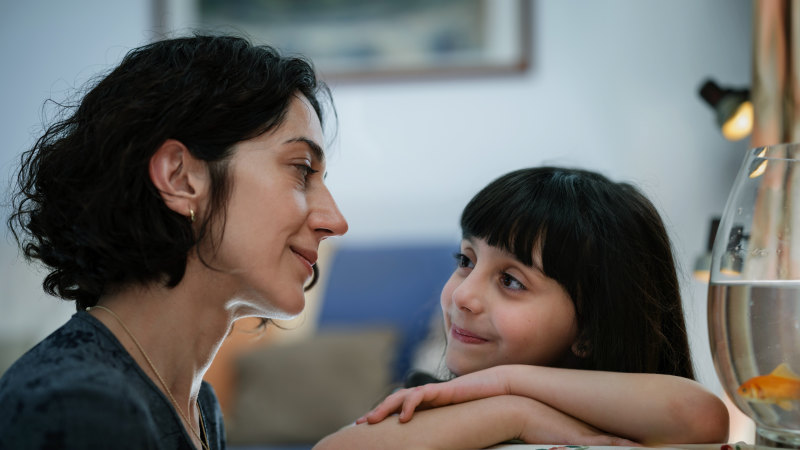Save articles for later
Add articles to your saved list and come back to them any time.
Shayda ★★★★
In cinemas, 117 minutes
A child’s perspective can reveal the greatest, most painful truths. Such is the way in Shayda, in which a young girl, Mona (Selina Zahednia), is the bridge between her mother, Shayda (Zar Amir Ebrahimi), and her abusive father, Hossein (Osamah Sami).
Hossein is studying medicine in Australia, after which he hopes to take his wife and daughter home to Iran with him. Shayda and the girl are living at a women’s shelter to escape Hossein’s violence, and the mother is stuck between a rock and a hard place: if she divorces Hossein, she might lose her daughter, but if she stays, what is she subjecting them both to? Meanwhile, judgment from her tight-knit ethnic community ominously hovers like a cloud.
Noora Niasari’s directorial debut, which premiered at Melbourne International Film Festival in August, is a tender, aching film that is based on the filmmaker’s own experiences, having lived in a Brisbane shelter with her mother at the age of five. Set in the ’90s and filmed in Melbourne, Shayda is thick with tension and fraught with danger, particularly in its second half as Hossein’s campaign to get his daughter back ramps up. Far from his roots in comedy, Sami is terrifying in this role, with some moments genuinely difficult to watch.
Zar Amir Ebrahimi as Shayda and Selina Zahednia as Mona in Noora Niasari’s debut feature Shayda.Credit: Jane Zhang
Ebrahimi and Zahednia deliver star performances that capture the special relationship between mother and daughter, and the child’s world unfurls especially beautifully: she loves The Lion King, plants and animals as much as she loves her mother. Mona tries to bond with her father, but can sense the disquiet. In one scene, she asks him, “Are you going to hurt mummy again?” after he promises her everything. As Shayda, Ebrahami is impressively multifaceted, communicating rage, despair, fear and protectiveness all with aplomb, and often with just a facial expression.
But amidst the fear, there are also genuine moments of joy and connection. The film is as much a testament to the resilience of domestic violence survivors and immigrants as it is an ode to the power of female friendship and solidarity, with many of its most exuberant moments taking place between the women at the shelter, including social worker Joyce (Leah Purcell). A haircut allows Shayda to feel like she’s starting something new, a liberation of sorts.
Cultural rituals wind their way through the narrative as Shayda and Mona prepare for Nowruz (Persian New Year), and dance is a repeated motif to symbolise community and connection. A budding romance between Shayda and a friend’s cousin Farhad (Mojean Aria) is the catalyst for poetic meditations on what it means to let go, or to start over again.
Small stylistic choices bring out the nuances and complexities of the story. Mona is often dressed in bright colours, in contrast to the mostly darker hues of the adults, particularly Hossein.
When Shayda is at the shelter, and especially when she is giving her testimony of domestic violence, her clothing is more muted – but when she heads out on the town with the other women, or to a Nowruz party, colour returns. The tightly controlled camera work also lends an air of oppression, but opens up for the story and characters to breathe at the right moments.
While the film’s denouement is slightly rushed, Niasari resists a simple or classically happy ending. There is uncertainty hovering around what happens next for Shayda and Mona, but there are sparks of hope for a kaleidoscope of futures. Shayda is a generous, deeply felt exploration of diasporic displacement and the aftermath of abuse; in telling one family’s story, Niasari opens the door for important conversations and empathy.
Find out the next TV, streaming series and movies to add to your must-sees. Get The Watchlist delivered every Thursday.
Most Viewed in Culture
From our partners
Source: Read Full Article

